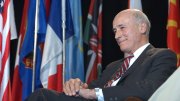Consistent with their commitment to communicate more regularly with the community—made last December when significant changes in the Harvard Corporation and University governance were announced—President Drew Faust and Senior Fellow Robert D. Reischauer today provided an initial briefing on developments during the winter and on the senior governing board's activities in recent months. Among the news items they discussed in a briefing at Loeb House were:
• Implementing the governance changes. Reischauer said the Corporation has focused "a tremendous amount" on expanding its membership (it will rise to 13 from the present seven) and effecting improvements in its operations. Members had discussed the kinds of individuals who might best "strengthen the capacity" of the Corporation as a governing entity capable of providing both oversight of and strategic guidance for the University. More than 300 names have been suggested as candidates for nomination to the Corporation, he said (see the announcement on the call for nominations)—many with "compelling descriptions" of what they might bring to the board. Other communications have been received offering counsel on how the Corporation might enhance its capabilities, its processes, and the committees it is now forming (to oversee University finances, capital planning and budgeting, and governance per se). Those discussions have been pursued at each Corporation meeting, Reischauer said, and during conference calls in between.
"We are making good progress on both fronts," he said. In response to a question, he indicated there was a "very high probability" that Corporation appointments and announcements about the committees would be forthcoming before the end of the academic year.
With an enlarged Corporation and the presumption of limited terms for members, the nature of the appointments is clearly changing. In the past, Reischauer indicated, each appointment was "episodic," and the individual chosen was almost always a generalist. In the future, the Corporation will gradually come to refresh itself regularly—President Faust called this a "constant matter of renewal"—with, on average, a pair of new members each two years. Thus, the search process will be continuous and developmental; the committee structure will enable people to become engaged with Harvard before a Corporation appointment is in question, and to become known to governing board members; and there will be a greater opportunity to include people with expertise in particular areas whom it might be advantageous to have directly involved in University governance at the highest level for a sustained period.
Reischauer indicated that as part of its more transparent operating style, the Corporation intended to publicize not only the names of the members when the committees are populated—as indicated, they are all but certain to include people who do not serve on the Corporation now, thus giving the board access to greater expertise and broader perspectives—but also the committees' charters.
• Matters operational and strategic. Reischauer indicated that the Corporation had, during the first quarter of the year, been engaged in the decisions concerning the return of early-action admissions to Harvard College, tuition, recognition of ROTC, capital-project appropriations, and, more broadly, the prospects for universities in general and Harvard in particular.
He cited the "first-rate staff support" provided for the review of early action, and a subsequent decision to reinstate it, taken "with a touch of sadness" that "the rest of the higher-education community didn't step up to the plate" (and also abolish early-admissions procedures, as Harvard and a few other institutions had hoped would be the case when they did so in 2006). The evaluation of tuition—determined annually—balanced as always, he said, the University's needs with the economic situation and family financial circumstances; the action taken (to raise the College term bill 3.6 percent, to $52,560 for the next academic year) kept the increase "as modest as possible" consonant with those goals.
As for ROTC, Reischauer said, the Corporation was "in full support of Drew's decision" to recognize the program formally, with financial and administrative support for participating students, and was positive about the changes the U.S. military had made "to bring about this reconciliation."
The capital projects vetted and approved late last year, consistent with limits on Harvard's overall borrowing capacity, include the "innovation laboratory" slated for an Allston property near the Harvard Business School campus, and the renovation of Old Quincy as a pilot project in advance of the much larger, long-awaited renewal of undergraduate Houses.
Faust noted that the Corporation had also been briefed in detail on such major projects as the reorganization of Harvard's library system and the plans to integrate the computer and information systems of the Faculty of Arts and Sciences and the central administration under the new chief information officer. Reischauer observed that such efforts to "increase administrative capacity" to support the work of Harvard's decentralized schools and academic units would likely be seen as critical hallmarks of this era, even though they proceed without much notice today. Faust noted that the Corporation has also been regularly briefed on progress in leasing Allston properties, and on the development-planning activities of the Allston Work Team.
As well, Reischauer said, the Corporation continued a recent tradition of having a luncheon discussion with the council of deans to talk broadly about the future of universities generally and "Harvard especially." The aim, he indicated, is to look at pressures and challenges 10 and 25 years into the future—how Harvard maintains its position as the premier university in the United States and internationally, even as other countries make significant investments in higher education (which is, he noted, "great for the world").
What kinds of issues had emerged? Faust said that, among others, they included the impact of technology on higher education—how to conduct effective teaching and learning among a generation of "digital native" students—and on intellectual collaborations as fields and disciplines change and evolve. These are, in other words, the very kinds of discussions of strategic issues of education and institutional concern that the changes in Harvard governance are intended to make possible, alongside augmented capacity to oversee the University's increasingly complex, and critical, finances and management in the twenty-first century.








